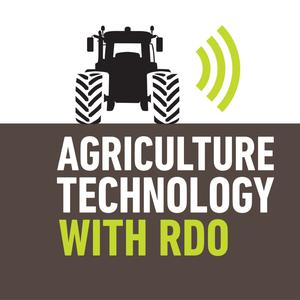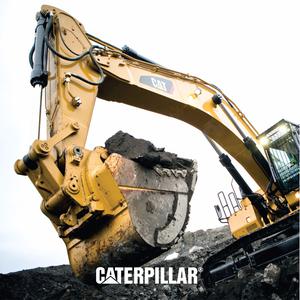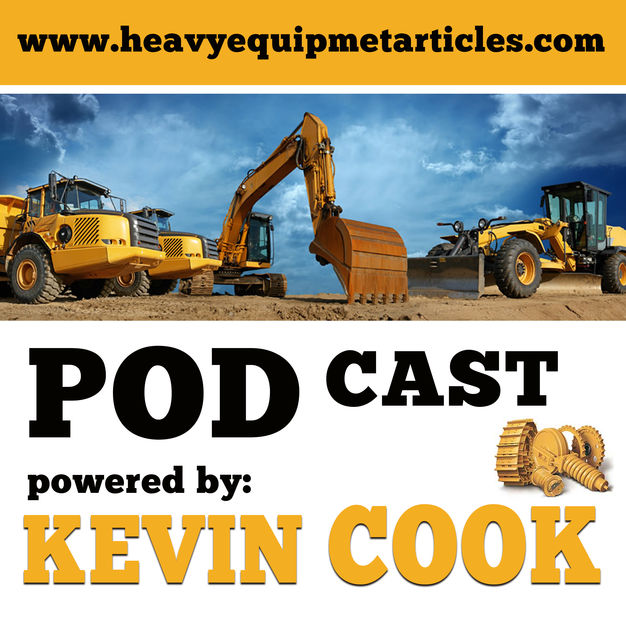
AEM Thinking Forward Podcast—Advancing the Equipment Manufacturing Industry
Association of Equipment Manufacturers
Make sure your business is prepared to adapt in a changing market. The AEM Thinking Forward Podcast is where leaders in the equipment manufacturing industry hear about the latest developments and disruptions in construction and agriculture. Listen regularly for insightful interviews with technology pioneers, industry heavyweights and established experts. The AEM Thinking Forward Podcast is brought to you by the Association of Equipment Manufacturers (AEM), which represents more than 1,000 North American heavy equipment manufacturers.
- 40 minutes 36 secondsEp. 25 – Bracing for Economic Uncertainty in 2020 and Beyond, with Harvard’s Dr. Vikram Mansharamani
With a new decade upon us, a lot of people in the construction and agriculture business world are marking this milestone with some uncertainty about what the future may hold. While the last decade was one of slow but uninterrupted economic growth, global trade skirmishes and political instability have given business leaders pause as the calendar turns to 2020.
So what do the experts expect to happen, and how can the heavy equipment industry be prepared for it? On this edition of the podcast, Harvard lecturer and economist Dr. Vikram Mansharamani weighs in with his take on the future. He’s a global trend hunter, author and equity investor, and his approach to managing risk and recognizing opportunities is the counsel you need as you plan for the next decade.
18 December 2019, 4:14 pm - 35 minutes 27 secondsEp. 24 – Micro-Generations in Your Workforce, with Courtney Scharf from Trend Hunter
As more Baby Boomers are reaching retirement age, equipment manufacturers who want to stay competitive are going to need to attract and retain younger workers. But many companies don’t have a plan for appealing to Gen X, Millennials and Gen Z.
And those that do might be basing it on false notions about generational thinking and mindsets. So in this edition of the podcast, Trend Hunter’s Senior Vice President of Research Services Courtney Scharf outlines their new, more precise framework of micro-generations, and shares some best practices that construction and agriculture equipment manufacturers can use to build an inter-generational workforce.
20 November 2019, 10:00 am - 36 minutes 39 secondsEp. 23 – Transportation Infrastructure That Multi-Tasks, with Allie Kelly from the Ray
In the U.S., around 13 million acres of land are used as roads and rights-of-way in the interstate highway system. That’s a lot of real estate, and all it does is provide a surface on which to operate cars and trucks.
But a pioneering new experiment in Georgia, known as The Ray, is reimagining what roads could look like if they multi-tasked. Allie Kelly, the executive director of The Ray, says their 18-mile stretch of highway is using IoT technology to communicate with smart cars, generating solar power, and even growing crops. And in this edition of the podcast, she explains how their project could mean new opportunities for the manufacturers of construction and agriculture equipment.
23 October 2019, 9:00 am - 37 minutes 51 secondsEp. 22 – Ford Futurist Sheryl Connelly: 7 Trends Reshaping Business in 2020 and Beyond
What does the future hold for equipment manufacturers? We asked one of the world’s most well-known experts in future trends in technology, Sheryl Connelly. Connelly holds the title of Chief Futurist at the Ford Motor Company, and publishes the Annual “Looking Further with Ford” trends report. For more than 20 years, she’s been tasked with helping company executives prepare for what’s on the third horizon. In this episode, she talks about the importance of applying a futurist mindset to the heavy equipment industry and seven trends that are reshaping the business world on a global scale.
25 September 2019, 9:00 am - 30 minutes 50 secondsEp. 21 – Cat® Safety VR: Caterpillar’s New Virtual Reality Training Solution for Contractors, with Justin Ganschow
Statistics show that up to 90% of job site accidents are caused by unsafe behavior, not conditions. And Justin Ganschow of Caterpillar Safety Services believes that worksite rookies and veterans alike can benefit from learning critical safety lessons in a controlled, VR environment.
In this episode, Ganschow takes AEM inside the Cat® Safety VR program, including a memorable hands-on demo, and explains the lessons that other equipment manufacturers can take away from the program’s success—like why workers who are trained on VR systems are more likely to remember their training than those who learn in a traditional classroom setting.
28 August 2019, 9:00 am - 40 minutes 33 secondsEp. 20 – Self-Driving Tech and the Future of Road-Building, with Forbes, May Mobility & Waymo's Autonomous Car
Just about every major player in Silicon Valley and the auto industry has efforts underway to develop autonomous car technology. Not only will self-driving cars change the way the construction industry builds roads, but some of that same tech will power the autonomous heavy equipment of the future.
In this episode, an update on who’s leading the autonomous charge from Alan Ohnsman, a senior editor at Forbes. Then, Ellice Perez from Waymo, formerly the Google self-driving car project, explains how equipment manufacturers can put LiDAR technology to work. And finally, what the advent of autonomous vehicles will mean for the roadbuilders of the future with Steve Vozar, the CTO of May Mobility.
24 July 2019, 9:00 am - 42 minutes 47 secondsEp. 19 – Ag Data: Helping Farmers Reap New Value, with Trimble’s Clint Dotterer and Frank Fidanza
Using farm data to improve operating margins is perhaps more important than ever, in a year where weak commodity prices, international trade uncertainty and abysmal planting conditions are putting farmers under serious pressure.
But how can equipment manufacturers help growers reap the benefits of digital technology? In this episode, two experts from AEM member Trimble share their insights. Director of Strategy for Trimble Ag Business Solutions Clint Dotterer outlines how and why data can create value for farmers. And Program Marketing Manager Frank Fidanza explains how he’s putting the technology to use on his family farm in New York.
Plus, AEM VP of Government and Industry Relations Kip Eideberg provides an update on the association’s advocacy efforts opposing tariffs.
26 June 2019, 9:00 am - 26 minutes 33 secondsEp. 18 - Electrification and Autonomy: Volvo CE’s Electric Quarry Test Site, with Dr. Fares Beainy
Electromobility and automation are two of the hottest topics in leading edge technology right now. And at a test site in Sweden, Volvo CE has proved that these technologies can be combined to run a quarry that's virtually emission-free.
In this episode, Volvo CE's Dr. Fares Beainy parses the benefits and challenges of an all-electric fleet of construction equipment and charts the future of autonomy for the construction industry.
Overall, the project achieved a 98% reduction in carbon emissions, 70% reduction in energy cost, and a 40% reduction in operator cost.
Learn more about the potential for autonomy in the equipment industry, or subscribe to the AEM Industry Advisor for regular updates in your email about industry news and insights.
22 May 2019, 9:00 am - 30 minutes 30 secondsEp. 17 - 3D Printed Concrete: How Oshkosh and Oak Ridge Are Developing a New Construction Technique, with Dr. Brian Post
Additive manufacturing, or 3D printing, shows growing potential as a technique for fabricating parts out of plastic or metal. But what about building structures out of concrete?
AEM member Oshkosh Corp. and Oak Ridge National Laboratory have teamed up to develop new 3D printed concrete technology, and the early results show the potential to reshape segments of the construction industry.
In this episode, Oak Ridge's Dr. Brian Post provides an update on the project's status and explores the possibilities that 3D printed concrete could unlock, while AEM members speculate on what it means to them.
Learn more about AEM's previous partnership with ORNL to build the world's first 3D printed excavator, or subscribe to the AEM Industry Advisor for regular updates in your email about industry news and insights.
24 April 2019, 9:00 am - 39 minutes 47 secondsEp. 16 - NASA Technology in Heavy Equipment and Inspiring the Mars Generation, with “Astronaut Abby” Harrison and Steven Gonzalez
Space may be the final frontier, but the technologies being developed to land the first humans on Mars can also be leveraged by tech-savvy OEMs in the heavy equipment industry.
In this episode, NASA technologist Steven Gonzalez explains the space agency's technology transfer program, which makes cutting-edge tech available to U.S. enterprises.
And 21-year-old "Astronaut Abby," Abigail Harrison, discusses her goal to be the first human to walk on Mars, and how manufacturers can inspire the next-generation workforce to pursue careers in STEM.
Learn more about AEM's workforce development efforts, or subscribe to the AEM Industry Advisor for regular updates in your email about industry news and insights.
27 March 2019, 9:00 am - 39 minutes 29 secondsEp. 15 - How Electrification, IoT and Other Trends Could Hit Heavy Equipment, with JLG’s Guru Bandekar and Singularity’s Andre Wegner
They say, “We’ve Always Done It That Way” are the six most destructive words in the business world. That’s truer than ever in an era of disruptive technology.
So what are the assumptions that define the heavy equipment manufacturing industry, and how could they be disrupted?
On this episode, AEM Futures Council chair Guru Bandekar from JLG Industries outlines some of those potential turning points, exploring electrification, IoT and other trends. And, fresh off his latest TED talk, Singularity University’s Digital Manufacturing Chair Andre Wegner explains why our industry shouldn’t fear technological disruption.
Learn more about how to stay ahead of tech disruption, or subscribe to the AEM Industry Advisor for regular updates in your email about industry news and insights.
27 February 2019, 10:00 am - More Episodes? Get the App
Your feedback is valuable to us. Should you encounter any bugs, glitches, lack of functionality or other problems, please email us on [email protected] or join Moon.FM Telegram Group where you can talk directly to the dev team who are happy to answer any queries.
 Agriculture Technology Podcast
Agriculture Technology Podcast
 CONEXPO – CON/AGG Radio: Construction Technology Trends For Contractors
CONEXPO – CON/AGG Radio: Construction Technology Trends For Contractors
 The Caterpillar Podcast
The Caterpillar Podcast
 Farm Equipment Podcast
Farm Equipment Podcast
 Heavy Construction Equipment Podcast
Heavy Construction Equipment Podcast